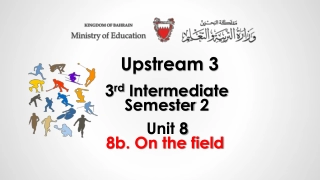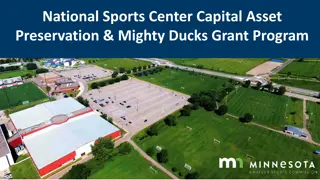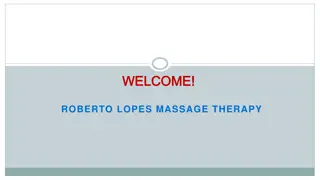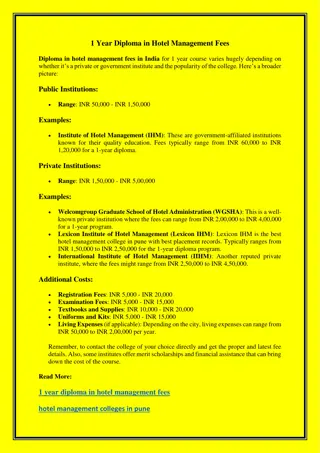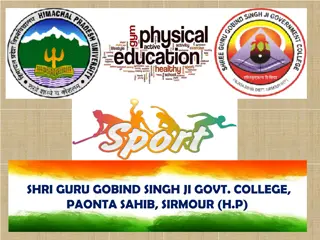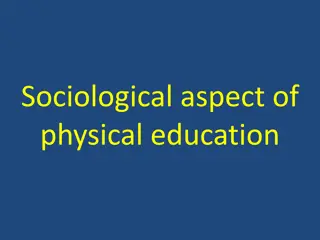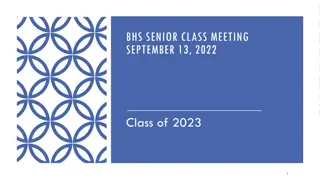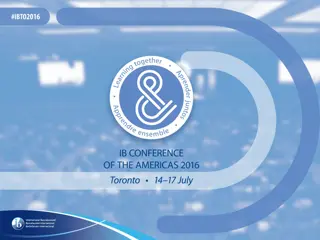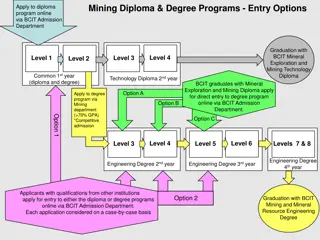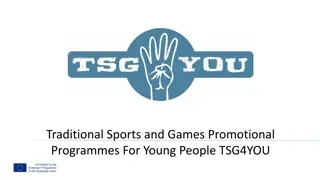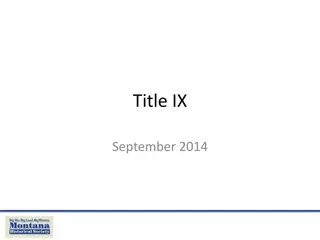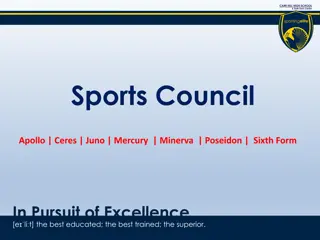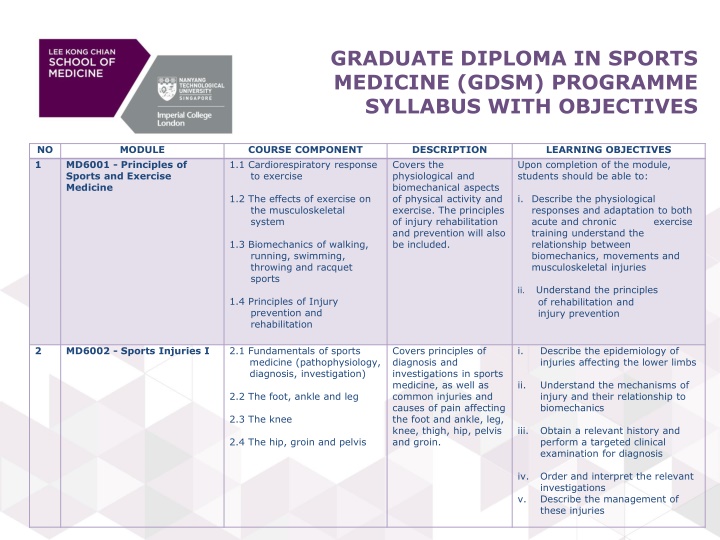
Graduate Diploma in Sports Medicine Programme Syllabus with Objectives
This syllabus outlines the modules, course components, and learning objectives of the Graduate Diploma in Sports Medicine programme. It covers topics such as cardiorespiratory response to exercise, musculoskeletal system effects of exercise, biomechanics of sports, injury prevention and rehabilitation, sports injuries diagnosis and management, physical activity benefits and risks, exercise prescription, and considerations for special populations.
Download Presentation

Please find below an Image/Link to download the presentation.
The content on the website is provided AS IS for your information and personal use only. It may not be sold, licensed, or shared on other websites without obtaining consent from the author. If you encounter any issues during the download, it is possible that the publisher has removed the file from their server.
You are allowed to download the files provided on this website for personal or commercial use, subject to the condition that they are used lawfully. All files are the property of their respective owners.
The content on the website is provided AS IS for your information and personal use only. It may not be sold, licensed, or shared on other websites without obtaining consent from the author.
E N D
Presentation Transcript
GRADUATE DIPLOMA IN SPORTS MEDICINE (GDSM) PROGRAMME SYLLABUS WITH OBJECTIVES NO 1 MODULE COURSE COMPONENT 1.1 Cardiorespiratory response to exercise DESCRIPTION Covers the physiological and biomechanical aspects of physical activity and exercise. The principles of injury rehabilitation and prevention will also be included. LEARNING OBJECTIVES Upon completion of the module, students should be able to: MD6001 - Principles of Sports and Exercise Medicine 1.2 The effects of exercise on the musculoskeletal system i. Describe the physiological responses and adaptation to both acute and chronic exercise training understand the relationship between biomechanics, movements and musculoskeletal injuries 1.3 Biomechanics of walking, running, swimming, throwing and racquet sports Understand the principles of rehabilitation and injury prevention ii. 1.4 Principles of Injury prevention and rehabilitation 2 MD6002 - Sports Injuries I 2.1 Fundamentals of sports medicine (pathophysiology, diagnosis, investigation) Covers principles of diagnosis and investigations in sports medicine, as well as common injuries and causes of pain affecting the foot and ankle, leg, knee, thigh, hip, pelvis and groin. i. Describe the epidemiology of injuries affecting the lower limbs ii. Understand the mechanisms of injury and their relationship to biomechanics 2.2 The foot, ankle and leg 2.3 The knee iii. Obtain a relevant history and perform a targeted clinical examination for diagnosis 2.4 The hip, groin and pelvis iv. Order and interpret the relevant investigations Describe the management of these injuries v.
GRADUATE DIPLOMA IN SPORTS MEDICINE (GDSM) PROGRAMME SYLLABUS WITH OBJECTIVES NO MODULE COURSE COMPONENT DESCRIPTION LEARNING OBJECTIVES 3 MD6003 - Sports Injuries II 3.1 The lumbar spine Covers the common injuries and causes of pain affecting the shoulder, elbow, wrist, hand and spine. i. Describe the epidemiology of injuries affecting the upper limbs and spine 3.2 The shoulder ii. Understand the mechanisms of injury and their relationship to biomechanics 3.3 The elbow, wrist and hand 3.4 The cervical spine and concussion in sports iii. Obtain a relevant history and perform a targeted clinical examination for diagnosis iv. Order and interpret the relevant investigations Describe the management of these injuries v. 4 MD6004 - Medical Considerations in Exercise and Sports 4.1 Risks and benefits of physical activity and exercise Covers benefits of regular physical activity. It will also include pre- participation screening guidelines and methodology, as well as equip candidates with the knowledge required to prescribe exercise for the healthy and low risk patient. i. Describe the physical and mental benefits of regular exercise ii. Describe the risks associated with exercise 4.2 Pre-participation screening 4.3 Clinical Exercise Testing and Cardiovascular Screening Tests iii. Perform risk stratification and identify patients who require pre- exercise screening 4.4 Exercise Prescription for Health and Common Chronic Disease iv. Describe the resources available for screening v. Prescribe exercise for healthy and low risk patients
GRADUATE DIPLOMA IN SPORTS MEDICINE (GDSM) PROGRAMME SYLLABUS WITH OBJECTIVES NO MODULE COURSE COMPONENT DESCRIPTION LEARNING OBJECTIVES 5 MD6005 - Exercise in Special Populations 5.1a Injuries in the child and adolescent athlete Covers exercise prescription in children and adolescents, women, the elderly, and injuries in the military environment. To provide candidates with an understanding of the issues related to exercise and sports participation in these client groups. This will enable candidates to prescribe exercise safely for these clients 5.1b Exercise in the elderly 5.2 Exercise in the female athlete and pregnancy 5.3 Exercise in people with disability 5.4 Injuries in the military population 6 MD6006 Thermal stress, drug use in sports, sports nutrition and event medical cover 6.1 Exercise in extreme environments and thermal injuries Covers the effects of exercise in extreme environments as well the rules and regulations in the WADA code. The relationship between nutrition and athletic performance, as well as the administrative aspects of providing medical cover for a sporting event or team are also included. i. Sports performance in cold and hot environments ii. Regulations on drug use, drug testing and exemptions 6.2 Doping in sports and the WADA code iii. Nutrition and hydration considerations at different phases of training and performance 6.3 Principles of sports nutrition 6.4 Travelling with a team and event medical cover iv. Requirements for providing safe and effective on-site medical cover
GRADUATE DIPLOMA IN SPORTS MEDICINE (GDSM) PROGRAMME SYLLABUS WITH OBJECTIVES NO MODULE COURSE COMPONENT DESCRIPTION LEARNING OBJECTIVES 7 Practical workshop with tutorial, practical demonstrations and hands-on practice. This workshop aims to impart practical skills on physical examination, assessment and diagnosis of musculoskeletal injuries, including the use of biomechanical principles and analyses of gait patterns to diagnose movement-related causes of injuries. To acquire physical examination techniques for the musculoskeletal system Workshop : Physical examination techniques 8 Practical workshop with tutorial and practical demonstrations. This workshop will impart practical skills and knowledge on exercise prescription for prevention and treatment of chronic disease. The materials covered include international guidelines and consensus on exercise prescription for public health purpose and pre-exercise medical clearance To gain basic skills and knowledge counselling patients on exercise programmes to maintain a good state of health and to improve health conditions for those with common chronic disease Workshop : Exercise Prescription Practicum 9 Practical workshop with tutorial and practical demonstrations. This workshop will impart basic skills and knowledge on exercise stress tests for maximum oxygen uptake (VO2max) and blood lactate response. Students will learn the physiological bases for these tests and also to interpret the test results. To gain fundamental understanding of VO2max and blood lactate responses during exercise performance, including the test procedures and interpretation of test results Workshop : Physiological lecture & demonstration Testing for sports performance
GRADUATE DIPLOMA IN SPORTS MEDICINE (GDSM) PROGRAMME SYLLABUS WITH OBJECTIVES NO 10 MODULE COURSE COMPONENT DESCRIPTION LEARNING OBJECTIVES Students will be attached to Sports Medicine Departments at CGH, KTPH, NUH and TTSH to work beside Sports Medicine Clinicians in managing actual cases in the clinic. Where possible and there are suitable ongoing event , the clinical attachment will also include medical cover of sporting events. Clinical Attachment Practical attachment
GRADUATE DIPLOMA IN SPORTS MEDICINE (GDSM) PROGRAMME SYLLABUS WITH OBJECTIVES NO MODULE COURSE COMPONENT DESCRIPTION LEARNING OBJECTIVES 11 Day 01 - Radiological investigations (2hrs) Students are expected to undergo training to support and help them in preparing for the examination. It comprises lectures, practical demonstrations and clinical skills assessment. Students would receive the following training: Summary Training Day 01 - Principles of rehabilitation - lecture & practicum Day 02 - Pitch-Side Medical Cover i. Physical Examination Techniques Day 03 Mock OSCE ii. Interpretation of Radiological Investigations iii. To impart practical skills for doctors when they provide medical coverage for sporting events and in the management of acute trauma and other sport-related injuries in the field. Case studies will be used to train students practical diagnostic skills, injury management and decision making in the field. iv. Sports Taping and Rehabilitation Techniques v. Exercise Testing and Prescription vi. Clinical Skills Assessment

